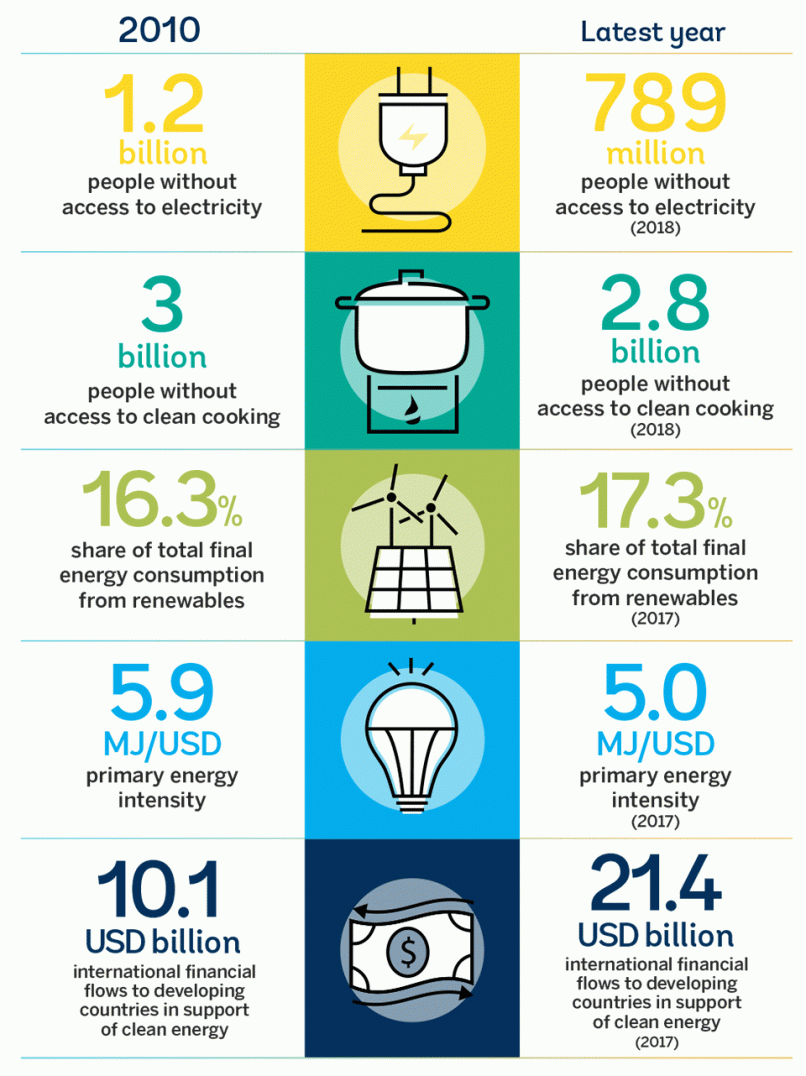New SEforALL business plan lays out ambitious vision to support faster progress on universal energy access during ‘decade of action’
2020 marks the beginning of a final ‘decade of action’ to achieve SDG7 — access to affordable, reliable, sustainable and modern energy for all. Yet the latest data shows that we are off track to meet these targets, and the global pandemic risks derailing progress even further.
Despite some progress in recent years, 789 million people still lack access to electricity today. A further 2.8 billion people – a third of the world’s population - have no access to clean cooking fuels and technologies, with numbers barely moving over the last decade. Further, despite the huge economic and environmental opportunity of energy efficiency and renewable energy, there has only been incremental progress over the last few years.
With ambitious action we can still achieve SDG7 by 2030 but the next few years are critical to increase energy access and deliver an energy transition that is truly inclusive, equitable and leaves no one behind – especially in the wake of the COVID-19 pandemic. With SEforALL’s unique mandate from the United Nations to drive action on SDG7, in full alignment with the Paris Agreement, the new business plan released today underscores why the organization’s global leadership is pivotal to meet this vision, and demonstrates a commitment to develop, implement and sustain solutions to achieve universal energy access by 2030.
The launch of the new business plan follows the implementation of a new strategy for SEforALL introduced by Damilola Ogunbiyi, CEO and Special Representative of the UN Secretary-General for Sustainable Energy for All and Co-Chair of UN-Energy, who took over the reins at SEforALL at the start of 2020. Speaking on the release of the business plan, she said: “As we embark on the final decade for achieving SDG7, we must expand beyond advocacy to action. We call on other organizations to do the same.
“The COVID-19 pandemic has brought unparalleled economic, political and social challenges. The crisis has also clearly shown that energy access saves lives. We now have an opportunity to not only recover better by investing in sustainable energy to help advance energy access, but also support progress on the other SDGs and the Paris Agreement while building a more resilient, inclusive global economy. This ambitious three-year plan is our commitment to help deliver sustainable energy for all by 2030.”
Under the new business plan, SEforALL has strategically chosen to strengthen global agenda-setting while expanding its activities to an engagement model that prioritizes data-driven decision-making, partnerships with high-impact countries and implementation on the ground.
SEforALL will focus on driving impact in key areas, including:
- Securing and tracking new commitments from countries and companies through ‘energy compacts’ to meet SDG7 and energy transitions.
- Accelerating the adoption of best-in-class integrated energy plans and policy and regulatory frameworks to guide efforts and drive investment in the sustainable energy sector.
- Ensuring that scaled-up and appropriate finance is flowing towards sustainable energy and energy access, including continuing to track and report on finance flows annually through the Energizing Finance research series.
- Supporting a significant increase in the pace of new energy connections, including implementing a new results-based financing facility in partnership with donors, and supporting sustainable energy for healthcare facilities.
- Mainstreaming inclusive and gender-sensitive action on energy, including supporting more women entering and advancing in the sustainable energy sector.
At the start of this final and decisive decade to achieve access to affordable, reliable, sustainable and modern energy for all, this new strategy and business plan positions SEforALL to be at the centre of a renewed global compact that recommits countries and companies to the actions necessary to achieve SDG7 by 2030. Advancing energy access will also advance progress on all the Sustainable Development Goals and the Paris Agreement commitments and help to build a more resilient, inclusive global economy post-COVID-19.
Read the three-year business plan in full here and follow SEforALL on Twitter for all the latest news and updates.
